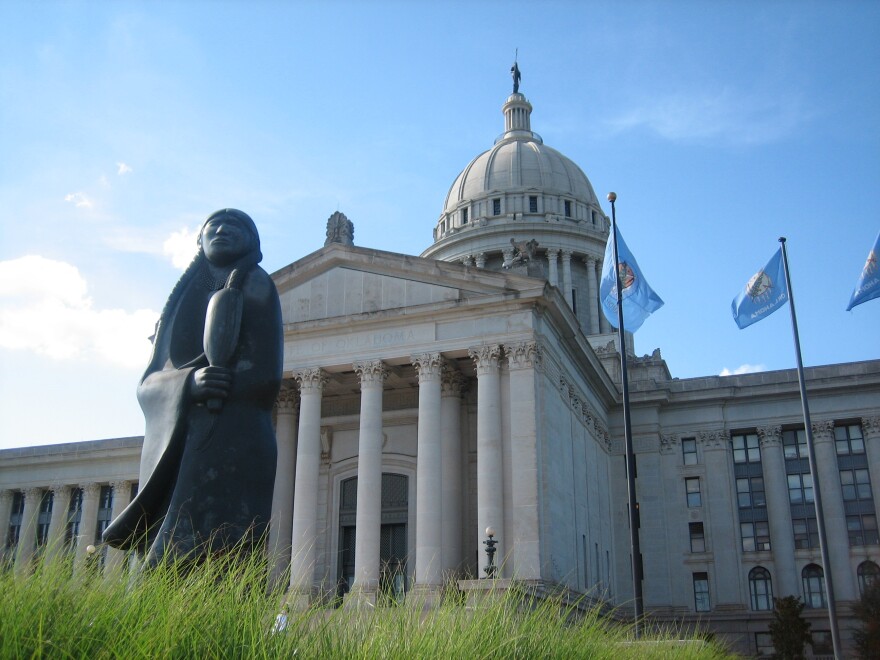As the calendar turns to December, legislators are getting serious about drafting bills for the upcoming legislative session. KGOU's Dick Pryor and eCapitol's Shawn Ashley discuss the process and important dates ahead.
TRANSCRIPT:
Dick Pryor: This is Capitol Insider, your weekly look inside Oklahoma politics, policy and government. I'm Dick Pryor with eCapitol news director Shawn Ashley. Shawn, the days around Thanksgiving frequently provide legislators time to listen to constituents and reflect on the year ahead. About now, it's time for them to get serious about the legislation they want to propose in the next legislative session. So about how many bills can legislators file?
Shawn Ashley: Well, the Senate has no limit on the number of bills that an individual legislator can file in the House. However, rank and file members generally are only permitted to carry eight pieces of legislation during the legislative session. Now, they can file more than that and they sort of have to make a choice then as to what's important and what is not important.
Dick Pryor: We already know there will be a lot of bills for legislators to consider.
Shawn Ashley: That's right. Coming out of the 2019 session, there are more than 2,300 pieces of legislation that that didn't make it through the process. Some of those are shell bills that have absolutely no language in them which could be revived. Others are bills that that have that are essentially complete and could move forward at any time from whatever stage of the legislative process they're in. Additionally, lawmakers will file close to 2,000 new pieces of legislation for consideration in the 2020 legislative session.
Dick Pryor: What are the next steps now for lawmakers as they move toward the start of the session in February?
Shawn Ashley: Well, the first deadline that they face comes up on December 13th, and that's the deadline to request a bill. Later in December or in early January is sort of what is called the final language deadline. That legislator who was looking at something related to charter schools, for example, will need to let House staff and Senate staff know maybe what school year that the law would take effect.
Dick Pryor: Specifics.
Shawn Ashley: They would have to let them know the specifics of the piece of legislation that they're asking to be drafted. And then the deadline for filing that legislation is in January. It's January 16th.
Dick Pryor: But by that time, they will have also participated in some budget hearings.
Shawn Ashley: That's right. We've already had some budget hearings. The House Appropriations and Budget subcommittees on public safety and on judiciary, as well as the Senate Appropriations Committee on Public Safety and Judiciary, which combines those two, has heard from the majority of the agencies under its control. Those subcommittees that deal with health and human services agencies are going to get started, it looks like, in December, and then we'll see more of those hearings in January, as well.
Dick Pryor: The governor submits his executive budget on the first day of the session. But before then, there's another important meeting, and that's the State Equalization Board.
Shawn Ashley: That's right. The Board of Equalization will meet on December 19th for the first pass at its revenue estimate for fiscal year 2021, which gets underway July 1st. They'll rely on a number of different data inputs in order to come up with their revenue estimate information that they get from Oklahoma State University on the overall economy trends in individual and individual tax collections over the last several years, in any changes which have taken place in law that might also affect tax collections. And it's that number that the governor uses to write his executive budget. The Board of Equalization will meet again in February and review any new data that's come in since its December meeting. And it is that number that the governor and the legislature use to negotiate from as they begin the process of writing the final budget.
Dick Pryor: The executive budget is released on the first day of the legislative session, which in 2020 will be February 3rd.
Shawn Ashley: That's correct. The governor will outline his policy objectives and budget objectives in his State of the State address that day. It gives us a good overview of what the governor is asking the legislature to do in that five month legislative session.
Dick Pryor: But, definitely over the next several weeks, there will be a lot of focus on the state revenue figures, the budget and the Oklahoma economy.
Shawn Ashley: And that's exactly true. What we've been seeing the last several months is moderate growth in revenue collections, but there have been some hiccups in there that officials have been particularly aware of.
Dick Pryor: Thanks, Shawn.
Shawn Ashley: You're very welcome.
Dick Pryor: That's Capitol Insider. If you have questions, email us at news@KGOU.ORG or contact us on Twitter @KGOUnews. You can also find us online at KGOU.ORG or ECAPITOL.NET. Until next time, with Shawn Ashley, I’m Dick Pryor.




